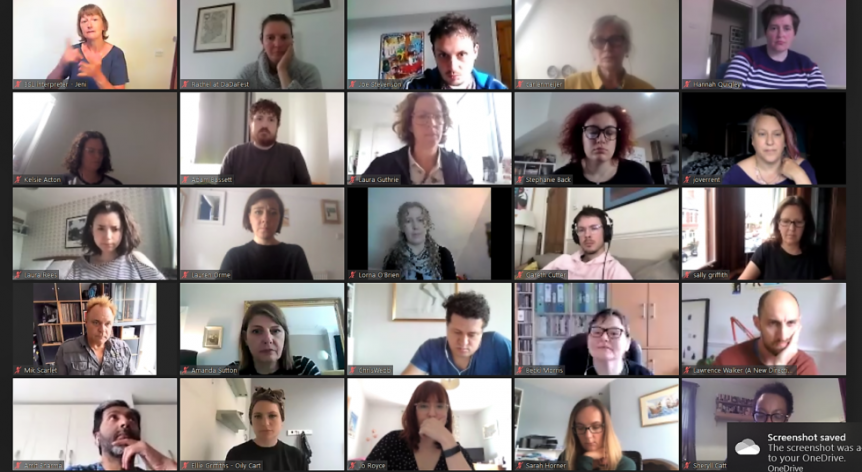How did the pandemic impact the University of Atypical?
The most obvious impact was the need to close the office and that all the staff had to work from home. All of the staff are disabled; that includes our core team and the freelancers, and some of our staff who were high risk and needed to shield, so effectively, everyone moved out of the office.
What were the immediate difficulties which emerged?
There were immediate difficulties in terms of organising Board of Trustees meetings. The Board of Trustees meets every month and we had to quickly reorganise those meetings online. Now, it wasn’t a complete shift, we did have a couple of people who because of their location and because of the nature of their disability, were used to working digitally. But there were a number of issues which we had to navigate; for example, the protocols of online meetings, we really didn’t know much about that and chairing those meetings was a real challenge.

Were there other difficulties?
We had two new members of staff at that time and it was difficult to provide inductions for them, to allow them to merge organically with the team. That meant that the normal building of new group dynamics didn’t happen easily. We are only coming out of all those changes now.
Working remotely was good in some ways; you do get a lot of admin work done, but I think a lot of people missed the social aspect of the work that we do, and it wasn’t just the staff. We would have people come in every day to sit and chat and maybe get a cup of tea while they are getting advice on certain issues and we know that makes a big difference to the lives of the people we support. That aspect of our work was certainly missed.
What about the University of Atypical’s programming?
The other big change was to move our programming online and of course that also had an impact on the Bounce Festival in 2020. I had to keep moving the launch date back as we waited for clear government guidelines but in the end we just had to go ahead with everything because it was getting too near the end of the year and so we moved the festival fully online. We learned a lot from those experiences and I think we will move towards a blended approach where appropriate in the future.
We also had to redesign projects and change all our dates and that brings funders into the picture because they have time frames they are working to. I was quite concerned about using up goodwill but the response from funders was generally supportive.
We also started campaigning with the Arts Council and the Department of Communities for funding for d/ Deaf, Disabled and Neurodiverse artists and we felt like we were pushing at an open door as we received very positive responses from the Minister, Deirdre Hargey, and from Roisin McDonough and Gilly Campbell from the Arts Council.
We are about to launch the third round of funding and by the time that is completed we will have distributed close to a quarter of a million pounds to d/ Deaf, Disabled and Neurodiverse artists.
Was your workload reduced by the pandemic?
No. A lot of people expected us to go quiet because the office was closed but actually our workload increased as we had to find ways to support those people who rely on our organisation.
As I said, we moved all our programmes online, we moved all of our advice sessions online, everything that we did went from being face to face, to being online and the first difficulty which emerges is the question of communication.
In the early days of ZOOM all sorts of issues emerged. I am hearing impaired myself, and I found working on ZOOM very difficult. None of us understood the protocols of ZOOM so you would often have three people speaking at the same time and that can be problematic. We had to work on a set of ZOOM protocols so that we could allow activities on ZOOM to run smoothly.
What about additional services?
We also needed to involve sign language interpreters, BSL and ISL, and we had to alert people to talk text software like Otter and Ava. If you were at a meeting, that software could be opened up on your phone or your tablet and you can get an immediate translation of what is being said and that was very useful.
We had to look at all of our work in the new paradigm. We had to produce instructional videos to help people fill out funding applications, and those videos have captions, there are BSL and ISL versions and they have voiceovers so everyone will be able to access the information.
We also had an online booking form for advice sessions. We initiated a process where people can tape themselves answering questions to the application forms using their specific sign language. And we appointed scribes to help those people who have difficulty writing.
We started a series of arts news broadcasts for the d/Deaf community which go out on Vimeo and that offers all the information which keeps them connected to the sector.

If you would like to find out more about the University of Atypical for Arts and Disability – see the link below
